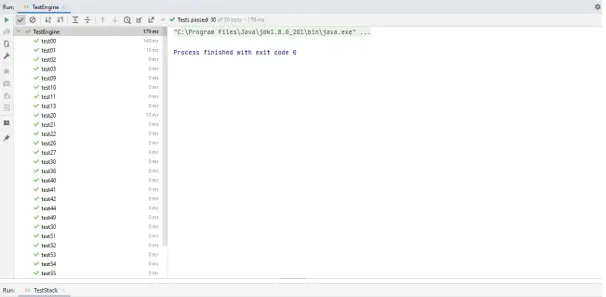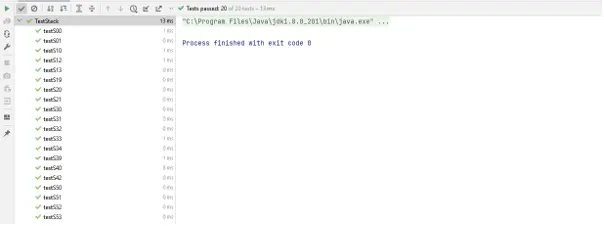Tip of the day
News
Instructions
Objective
Write a Java assignment program to implement the stack ADT in the Java language. This assignment will involve creating a Java program that demonstrates the use of stacks, a fundamental data structure. Stacks follow the Last In, First Out (LIFO) principle and are commonly used for various applications such as expression evaluation, backtracking algorithms, and more. By completing this assignment, you will gain a deeper understanding of how to work with classes, methods, and data structures in Java, enhancing your programming skills along the way.
Requirements and Specifications

Screenshot


Source Code
TEST ENGINE
import java.io.StringReader;
import edu.uwm.cs.junit.LockedTestCase;
import edu.uwm.cs351.ps.Array;
import edu.uwm.cs351.ps.Engine;
import edu.uwm.cs351.ps.Interpreter;
import edu.uwm.cs351.ps.Scanner;
public class TestEngine extends LockedTestCase {
Engine engine;
protected void setUp() {
engine = new Engine(10,10);
}
protected void execute(String s) {
Interpreter i = new Interpreter(new Scanner(new StringReader(s)), engine);
i.run();
}
public void test00() {
engine.push("a");
engine.push("b");
engine.push("c");
// debug string prints the stack:
assertEquals(Ts(1246496985),engine.debugString());
execute("pop");
assertEquals("[a, b]",engine.debugString());
execute("(d)"); // Recall that parens are PostScript's way to show string literals
assertEquals(Ts(1069313328),engine.debugString());
}
public void test01() {
engine.push("a");
engine.push("b");
engine.push("c");
execute("0 index");
assertEquals("[a, b, c, c]",engine.debugString());
}
public void test02() {
engine.push("a");
engine.push("b");
engine.push("c");
execute("1 index");
assertEquals(Ts(1810631773), engine.debugString());
}
public void test03() {
engine.push("a");
engine.push("b");
engine.push("c");
execute("2 index");
assertEquals("[a, b, c, a]", engine.debugString());
}
public void test09() {
execute("(7) (6) (5) (4) (3) (2) (1) 3 index");
assertEquals("[7, 6, 5, 4, 3, 2, 1, 4]", engine.debugString());
}
public void test10() {
execute("count");
Double d = (Double)engine.pop();
assertEquals(Ti(839574740),d.intValue());
}
public void test11() {
engine.push("a");
execute("count");
Double d = (Double)engine.pop();
assertEquals(1,d.intValue());
}
public void test13() {
engine.push("a");
engine.push("b");
engine.push("c");
execute("count");
Double d = (Double)engine.pop();
assertEquals(3,d.intValue());
}
public void test20() {
execute("[ counttomark");
assertEquals("[, 0.0]",engine.debugString());
Double d = (Double)engine.pop();
assertEquals(0,d.intValue());
}
public void test21() {
execute("[ (a) (b) [ (c) counttomark");
Double d = (Double)engine.pop();
assertEquals(1,d.intValue());
assertEquals("[, a, b, , c]",engine.debugString());
}
public void test22() {
execute("[ (a) [ (b) (c) counttomark");
Double d = (Double)engine.pop();
assertEquals(Ti(1368049932),d.intValue());
assertEquals("[, a, , b, c]",engine.debugString());
}
public void test26() {
execute("[ (a) [ (b) (c) (d) (e) (f) (g) (h) counttomark");
Double d = (Double)engine.pop();
assertEquals(7,d.intValue());
assertEquals("[, a, , b, c, d, e, f, g, h]",engine.debugString());
}
public void test27() {
execute("[ (0, 1) [ (a) (b, c) ([) (d, e) counttomark");
Double d = (Double)engine.pop();
assertEquals(4, d.intValue());
assertEquals("[, 0, 1, , a, b, c, [, d, e]", engine.debugString());
}
public void test30() {
execute("(a) [ cleartomark");
assertEquals("[a]",engine.debugString());
}
public void test36() {
execute("[ (z) [ 1 2 3 4 5 (c) cleartomark");
assertEquals("[, z]",engine.debugString());
}
public void test40() {
execute("[]");
Array a = (Array)engine.pop();
assertEquals(0,a.length());
assertEquals("[]",engine.debugString()); // coincidence
}
public void test41() {
execute("(hello) [ ]");
Array a = (Array)engine.pop();
assertEquals(0,a.length());
assertEquals("[hello]",engine.debugString());
}
public void test42() {
execute("[ (one) [ (two) ]");
Array a = (Array)engine.pop();
assertEquals(1, a.length());
assertEquals("two", a.get(0));
assertEquals("[, one]",engine.debugString());
}
public void test44() {
execute("(a) [ 1 2 3 4 ]");
Array a = (Array)engine.pop();
assertEquals(4,a.length());
assertEquals(Double.valueOf(1),a.get(0));
assertEquals(Double.valueOf(2),a.get(1));
assertEquals(Double.valueOf(3),a.get(2));
assertEquals(Double.valueOf(4),a.get(3));
assertEquals("[a]",engine.debugString());
}
public void test49() {
execute("[ 9 [ (b) [ (c) (d) ] 10 20 30]");
Array a = (Array)engine.pop();
assertEquals(5,a.length());
assertEquals("b",a.get(0));
Array a2 = (Array)a.get(1);
assertEquals(2, a2.length());
assertEquals("c",a2.get(0));
assertEquals("d",a2.get(1));
assertEquals(Double.valueOf(10),a.get(2));
assertEquals(Double.valueOf(20),a.get(3));
assertEquals(Double.valueOf(30),a.get(4));
assertEquals("[, 9.0]",engine.debugString());
}
public void test50() {
execute("(a) (b) (c) (d) 2 0 roll");
assertEquals(Ts(1670987571),engine.debugString());
}
public void test51() {
execute("(a) (b) (c) (d) 2 1 roll");
assertEquals("[a, b, d, c]",engine.debugString());
}
public void test52() {
execute("(a) (b) (c) (d) 2 -1 roll");
assertEquals("[a, b, d, c]",engine.debugString());
}
public void test53() {
execute("(a) (b) (c) (d) 3 1 roll");
assertEquals(Ts(763956264),engine.debugString());
}
public void test54() {
execute("(a) (b) (c) (d) 3 2 roll");
assertEquals("[a, c, d, b]",engine.debugString());
}
public void test55() {
execute("(a) (b) (c) (d) 3 -1 roll");
assertEquals("[a, c, d, b]",engine.debugString());
}
public void test56() {
execute("(a) (b) (c) (d) 4 1 roll");
assertEquals("[d, a, b, c]",engine.debugString());
}
public void test57() {
execute("(a) (b) (c) (d) 4 -2 roll");
assertEquals("[c, d, a, b]",engine.debugString());
}
public void test58() {
execute("(a) (b) (c) (d) 4 -1 roll");
assertEquals("[b, c, d, a]",engine.debugString());
}
public void test59() {
execute("(1) (2) (3) (4) (5) (6) (7) (8) (9) 7 -5 roll");
assertEquals("[1, 2, 8, 9, 3, 4, 5, 6, 7]",engine.debugString());
}
}
TEST STACK
import edu.uwm.cs.junit.LockedTestCase;
import edu.uwm.cs351.util.Stack;
public class TestStack extends LockedTestCase {
protected void assertException(Class c, Runnable r) {
try {
r.run();
assertFalse("Exception should have been thrown",true);
} catch (RuntimeException ex) {
assertTrue("should throw exception of " + c + ", not of " + ex.getClass(), c.isInstance(ex));
}
}
private Stack
s;
@Override
protected void setUp() {
try {
assert s.isEmpty();
assertFalse("Please turn on assertions!",true);
} catch (NullPointerException ex) {
assertTrue(true);
}
s = new Stack
();
}
public void testS00() {
Stack
s = new Stack
();
assertTrue(s.isEmpty());
}
public void testS01() {
assertTrue(s.isEmpty());
}
public void testS10() {
s.push(77);
assertEquals(Tb(1948889376), s.isEmpty());
assertEquals(Ti(717212931), s.peek().intValue());
assertEquals(Tb(1575342336), s.isEmpty());
assertEquals(Ti(1634853426), s.pop().intValue());
assertEquals(Tb(176940846), s.isEmpty());
}
public void testS12() {
s.push(42);
s.push(-9);
assertEquals(Ti(1627457663),s.peek().intValue());
assertFalse(s.isEmpty());
assertEquals(Ti(1230102286),s.pop().intValue());
assertFalse(s.isEmpty());
assertEquals(Ti(2006237031),s.peek().intValue());
assertEquals(42,s.pop().intValue());
assertTrue(s.isEmpty());
}
public void testS13() {
s.push(0);
s.push(-32768);
s.push(88);
assertEquals(Ti(1667245384),s.peek().intValue());
assertFalse(s.isEmpty());
assertEquals(88,s.pop().intValue());
assertFalse(s.isEmpty());
assertEquals(-32768,s.peek().intValue());
assertEquals(Ti(1859343223),s.pop().intValue());
assertEquals(Ti(2050818480),s.pop().intValue());
assertTrue(s.isEmpty());
}
public void testS19() {
s.push(null);
assertFalse(s.isEmpty());
assertNull(s.peek());
assertNull(s.pop());
assertTrue(s.isEmpty());
}
public void testS20() {
try {
s.pop();
assertFalse("pop of an empty stack returned",true);
} catch (Exception e) {
//what exception should be thrown?
assertEquals(Ts(570783829), e.getClass().getSimpleName());
}
}
public void testS21() {
try {
s.peek();
assertFalse("peek on an empty stack returned",true);
} catch (Exception e) {
//what exception should be thrown?
assertEquals(Ts(1903488762), e.getClass().getSimpleName());
}
}
public void testS30() {
assertTrue(s.clone().isEmpty());
}
public void testS31() {
s.push(1001);
Stack
c = s.clone();
assertEquals(1001,c.pop().intValue());
assertEquals(1001,s.peek().intValue());
}
public void testS32() {
s.push(169);
Stack
c = s.clone();
s.push(343);
c.push(-55);
assertEquals(Ti(1620679750),c.peek().intValue());
assertEquals(Ti(324933978),s.pop().intValue());
assertEquals(-55,c.pop().intValue());
assertEquals(Ti(1020844101),s.pop().intValue());
assertEquals(Ti(695736991),c.pop().intValue());
}
public void testS33() {
class Hidden extends Stack
{
public boolean isEmpty() {
return true;
}
}
Hidden h = new Hidden();
Stack
st = h.clone();
assertTrue("clone didn't use super.clone()",st instanceof Hidden);
}
public void testS34() {
Stack
s1 = new Stack
();
Stack
s2 = s1.clone();
s1.push("hello");
s2.push("bye");
assertEquals(Ts(2131980359),s1.pop());
assertEquals(Ts(1875506833),s2.pop());
}
public void testS39() {
for (int i=0; i < 1000; ++i) {
s.push(i);
}
Stack
c = s.clone();
for (int i=1; i < 500; ++i) {
assertEquals(1000,i+c.pop());
assertEquals(1000,i+s.pop());
}
s.push(-17);
c.push(33);
assertEquals(-17,s.pop().intValue());
assertEquals(33,c.pop().intValue());
}
public void testS40() {
for (int i=0; i < 1000; ++i) {
s.push(i);
assertFalse(s.isEmpty());
}
for (int i=0; i < 1000; ++i) {
if ((i & 1) == 0) {
assertEquals(999,i+s.peek());
}
assertEquals(999,i+s.pop());
}
}
public void testS42() {
for (int i=0; i < 1000; ++i) {
s.push(i);
}
s.clear();
assertTrue(s.isEmpty());
s.clear();
assertTrue(s.isEmpty());
}
public void testS50() {
// elements separated by ", " in square brackets
assertEquals(Ts(1790144628),s.toString());
}
public void testS51() {
// elements separated by ", " in square brackets
s.push(-4);
assertEquals(Ts(789077849),s.toString());
}
public void testS52() {
// elements separated by ", " in square brackets
s.push(13);
s.push(20);
assertEquals(Ts(328978396),s.toString());
}
public void testS53() {
s.push(null);
s.push(-1492);
s.push(null);
assertEquals("[null, -1492, null]",s.toString());
}
}
Related Samples
Explore Java Assignment Samples: Dive into our curated selection featuring Java solutions across object-oriented programming concepts. From fundamental algorithms to GUI applications, each sample demonstrates clear coding methodologies. Enhance your Java proficiency and master programming techniques with comprehensive examples tailored to student needs.
Java
Word Count
3961 Words
Writer Name:Chloe Wong
Total Orders:590
Satisfaction rate:
Java
Word Count
5749 Words
Writer Name:Tia Connor
Total Orders:964
Satisfaction rate:
Java
Word Count
4042 Words
Writer Name:Dr. Chloe jhones
Total Orders:750
Satisfaction rate:
Java
Word Count
6299 Words
Writer Name:Dr. Amanda C. Smallwood
Total Orders:356
Satisfaction rate:
Java
Word Count
4093 Words
Writer Name:Dr. Donald K. Grainger
Total Orders:689
Satisfaction rate:
Java
Word Count
3941 Words
Writer Name:Dr. Robert M. Sanchez
Total Orders:425
Satisfaction rate:
Java
Word Count
6086 Words
Writer Name:Prof. Liam Saunders
Total Orders:900
Satisfaction rate:
Java
Word Count
5597 Words
Writer Name:Dr. Candace J. Gentry
Total Orders:621
Satisfaction rate:
Java
Word Count
4942 Words
Writer Name:Dr. Julia Wong
Total Orders:426
Satisfaction rate:
Java
Word Count
6782 Words
Writer Name:Dr. Ophelia Whitethorn
Total Orders:759
Satisfaction rate:
Java
Word Count
5142 Words
Writer Name:Jessica Miller
Total Orders:652
Satisfaction rate:
Java
Word Count
8786 Words
Writer Name:Prof. Alexander Choice
Total Orders:900
Satisfaction rate:
Java
Word Count
6994 Words
Writer Name:Alex Thompson
Total Orders:1521
Satisfaction rate:
Java
Word Count
6718 Words
Writer Name:Chloe Wong
Total Orders:590
Satisfaction rate:
Java
Word Count
4871 Words
Writer Name:Dr. Marlowe Emberly
Total Orders:789
Satisfaction rate:
Java
Word Count
8521 Words
Writer Name:Dr. Zara Silvermist
Total Orders:654
Satisfaction rate:
Java
Word Count
3595 Words
Writer Name:Dr. Seraphina Stormcloud
Total Orders:852
Satisfaction rate:
Java
Word Count
3694 Words
Writer Name:Dr. George M. Long
Total Orders:507
Satisfaction rate:
Java
Word Count
4842 Words
Writer Name:Professor Harriet Sinclair
Total Orders:387
Satisfaction rate:
Java
Word Count
4329 Words
Writer Name:Dr. Seraphina Stormcloud
Total Orders:852
Satisfaction rate:
